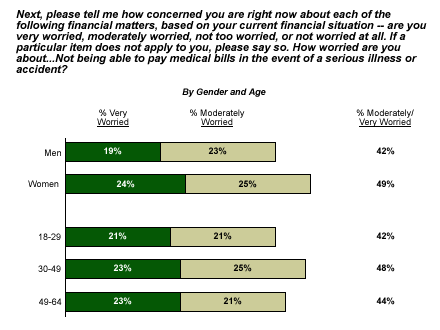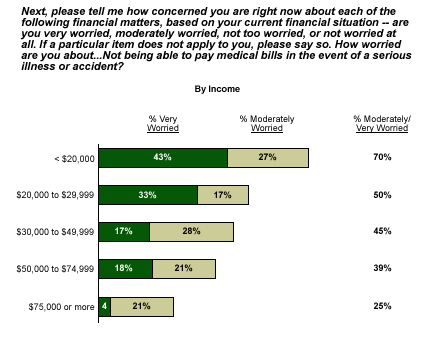This is the third in a series of articles on Americans' levels of concern with a variety of financial and economic issues.
Given the recent economic downturn, one might expect that Americans' greatest financial concerns might include such day-to-day things as not having enough money to pay monthly bills, or make credit card, mortgage, or rent payments. Actually, though while some Americans are worried about paying their monthly bills, long-term concerns tend to take precedence for many. An April Gallup poll* found that the most common financial worry among Americans is not having enough money for retirement (see "Worried About…Retirement?"). Second to retirement is the fear of not having enough money to pay medical bills resulting from a serious illness or accident.
Overall, the data show that nearly half of all Americans (45%) say they are very worried (21%) or moderately worried (24%) about not having enough money to pay their medical costs in the event of a serious illness or accident. This concern is shared by men and women; people of all ages surveyed; and Americans of all income levels.
One reason for this level of concern may simply be that many Americans lack medical insurance altogether. And even among those who are insured, the coverage may not be sufficient to cover a serious illness or accident. Many medical insurance policies come with a lifetime maximum coverage that may be quickly exceeded during a serious health crisis.
Moreover, many insurance policies will not cover certain types of treatments. Americans working for small businesses sometimes find that a serious illness can send small-group medical insurance premiums to prohibitively high levels. And, major medical expenses are a frequent cause of bankruptcy today.
In recent years, there has been a great deal of talk in the nation's capital about HMOs, Medicare and prescription drugs -- but very little about catastrophic illness/accident insurance. This public good benefit could be provided at reasonable premiums with little if any cost to the government. Since the number of people directly impacted by such tragedies is relatively small, the incentive to develop this type of benefit is also small -- but policy-makers may want to consider the fact that the number of Americans worried about the costs of a serious illness or accident is actually very large.
Worry Is High Across Age and Gender Groups
While a higher percentage of women (49%) than men (42%) say they are moderately or very worried about having enough money to pay the medical costs associated with a serious illness or accident, both genders are clearly concerned. Surprisingly similar percentages of those younger Americans aged 18 to 29 (42%), those aged 30 to 49 (48%), and those aged 50 to 64 (44%) say they are moderately or very worried about paying for a serious illness or accident.

Worry Is Also High in Most Income Groups
As might be expected, the lowest income group (those making less than $20,000 a year) has the highest percentage (70%) of those worried about having enough money to pay the medical costs associated with a serious illness or accident. Also as expected, the highest income group (those making $75,000 or more a year) shows the lowest percentage (25%) of those worried about paying the medical bills from a serious illness or accident. Still, a substantial percentage of Americans in all age groups surveyed are concerned about the potential of such extraordinary medical costs.

*Results are based on telephone interviews with 1,003 adults, aged 18 and older, conducted April 8-11, 2002. For results based on the total sample, one can say with 95% confidence that the maximum margin of sampling error is ±3%.

